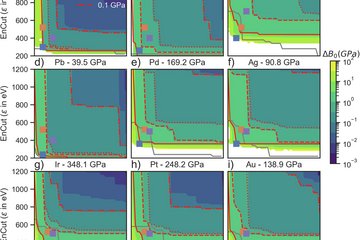All genres
121.
Talk
Exploiting large ab initio data spaces to design materials. Openning of Christian Doppler Laboratory for nanoscale phase transformations, Linz, Austria (2019)
122.
Talk
Exploration of large ab initio data spaces to design materials with superior mechanical properties. Physics and Theoretical Division Colloquium, Los Alamos, NM, USA (2019)
123.
Talk
Impact of chemical compositions and interstitial alloying on the stacking fault energy of CrMnFeCoNi-based HEAs from first principles. The 2nd International Conference on High-Entropy Materials , Jeju, South Korea (2018)
124.
Talk
Stacking fault energies of CrMnFeCoNi-based high entropy alloys from ab initio. Materials Science and Engineering 2018 (MSE) , Darmstadt, Germany (2018)
125.
Talk
Phonon broadening in high entropy alloys. TMS 2018, Phoenix, AZ, USA (2018)
126.
Talk
Energetics of non-stoichiometric stacking faults in Fe–Nb alloys: An ab initio study. DPG-Frühjahrstagung 2018, Berlin, Germany (2018)
127.
Talk
Temperature-driven effects in functional materials: Ab initio insights. Talk at University Pierre and Marie CURIE (UPMC), Paris, France (2017)
128.
Talk
Impact of Magnetism on the Stability of Topologically Close-packed (TCP) Phases in Fe–Nb Alloys. Intermetallics 2017, Educational Center Kloster Banz, Bad Staffelstein, Germany (2017)
129.
Talk
Impact of magnetic fluctuations on phonons: a Green's function-based approach. MPIE-ICAMS workshop, Ebernburg, Germany (2017)
130.
Talk
Parameter-free Finite-temperature Computations of Stacking Fault Energies for Magnetic Materials. TMS Annual Meeting 2017, San Diego, CA, USA (2017)
131.
Talk
Parameter-free Computational Design of Magnetic Materials – Recent Advances in Ab Initio Techniques of Coupled Lattice and Spin Fluctuations. MRS Fall Meeting 2016, Boston, MA, USA (2016)
132.
Talk
Thermodynamic properties of the quaternary Q phase in Al–Cu–Mg–Si: a combined ab-initio, phonon and compound energy formalism approach. Materials Science and Engineering 2016 (MSE), Darmstadt, Germany (2016)
133.
Talk
Thermodynamic properties of the quaternary Q phase in Al–Cu–Mg–Si: a combined ab-initio, phonon and compound energy formalism approach. International Conference on Advanced Materials Modelling (ICAMM), Rennes, France (2016)
134.
Talk
Heat capacity of the quaternary Q phase in Al–Cu–Mg–Si: A combined ab-initio, phonon and compound energy formalism approach. DPG-Frühjahrstagung 2016, Regensburg, Germany (2016)
135.
Talk
Lattice excitations in magnetic alloys: Recent advances in ab initio modeling of coupled spin and atomic fluctuations. TMS Annual Meeting 2016, Nashville, TN, USA (2016)
136.
Talk
Shear Transformation in a Non-Equiatomic CoCrFeMnNi High-Entropy Alloy. 2016 MRS Fall Meeting, Boston, MA, USA (2016)
137.
Talk
Thermodynamics and Mechanical Properties of Non-Equiatomic CoCrFeMnNi Alloys. 2016 MRS Fall Meeting, Boston, MA, USA (2016)
138.
Talk
Temperature dependent coupling of atomic and magnetic degrees of freedom from first-principles. Workshop on Electronic Structure Theory of Accelerated Design of Structural Materials, Moscow, Russia (2015)
139.
Talk
Temperature-dependent coupling of atomic and magnetic degree of freedom from first-principles. Electronic Structure Theory for the Accelerated Design of Structural Materials, Moscow, Russia (2015)
140.
Talk
Coupling of magnetic and lattice degrees of freedom in bulk materials. Magnetism Workshop, Fagerudd, Sweden (2015)











